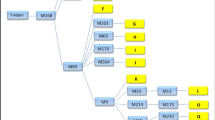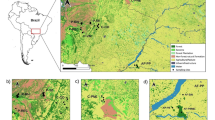Abstract
Estimation of the purging of detrimental effects through inbreeding and selection is an important issue in conservation genetics opening new perspectives for the management of small populations. In 1997 Ballou proposed the ancestral inbreeding coefficient, which is calculated recursively via pedigree inbreeding coefficients, as a tool for evaluating the purging of deleterious alleles in zoo populations. The formula of Ballou assumes independence of inbreeding and ancestral inbreeding coefficients at any stage of the recursion. This study investigates the consequences of this inaccuracy on the estimation of true ancestral inbreeding, i.e. the proportion of alleles within a genome that has undergone inbreeding in the past. As an alternative we propose the estimation of ancestral inbreeding by the method of gene dropping. The methods are compared by stochastic simulation for various models with respect to mode of inheritance (neutral, detrimental and lethal alleles) and different settings for population size and initial allele frequencies. In all scenarios the proportion of alleles within a genome that has undergone inbreeding in the past was overestimated by Ballou’s formula. The overestimation was more pronounced in smaller populations but was not affected by genetic model or initial allele frequency. In contrast, the ancestral inbreeding coefficient calculated by gene dropping provided a robust estimate of ancestral inbreeding in most models and settings. A marginal overestimation was observed only in models with lethal alleles. Therefore, we recommend applying the gene dropping approach to estimate ancestral inbreeding coefficients.
Similar content being viewed by others
References
Ballou JD (1997) Ancestral inbreeding only minimally affects inbreeding depression in mammalian populations. J Hered 88:169–178
Baumung R, Sölkner J (2003) Pedigree and marker information requirements to monitor genetic variability. Genet Sel Evo 35:369–383
Byers DL, Waller DM (1999) Do plant populations purge their genetic load? Effects of population size and mating history on inbreeding depression. Annu Rev Ecol Syst 30:479–513
Charlesworth D, Charlesworth B (1987) Inbreeding depression and its evolutionary consequences. Annu Rev Ecol Syst 18:237–268
Edwards AWF (1968) Simulation studies of genealogies. Heredity 23:628. Abstract of a presented paper
Frankham R, Gilligan DM, Morris D, Briscoe DA (2001) Inbreeding and extinction: effects of purging. Conserv Genet 2:279–285
Fu YB, Namkoong G, Carlson JE (1998) Comparison of breeding strategies for purging inbreeding depression via simulation. Conserv Biol 12:856–864
Haig SM, Ballou JD, Derrickson SR (1990) Management options for preserving genetic diversity: reintroduction of Guam rail to the wild. Conserv Biol 4:290–300
Hedrick PW (1994) Purging inbreeding depression and the probability of extinction: full-sib mating. Heredity 73:363–372
Hedrick PW, Kalinowski ST (2000) Inbreeding depression in conservation biology. Annu Rev Ecol Syst 31:139–162
Honda T, Nomura T, Fukushima M, Mukai F (2002) Gene dropping analysis of founder contributions in a closed Japanese black cattle population. Anim Sci J 73:105–111
Kalinowski ST, Hedrick PW, Miller PS (2000) Inbreeding depression in the Speke’s Gazelle captive breeding program. Conserv Biol 14:1375–1384
Lynch M, Walsh B (1998) Genetics and analysis of quantitative traits. Sinauer, Sunderland, MA
MacCluer JW, VandeBerg JL, Read B, Ryder OA (1986) Pedigree analysis by computer simulation. Zool Biol 5:147–160
Princee FG (1988) Genetic variation in the zoo population of the red panda subspecies Ailurus fulgens fulgens. Zool Biol 7:219–231
Richards FJ (1959) A flexible growth function for empirical use. J Exp Bot 10:290–300
Templeton AR, Read B (1983) The elimination of inbreeding depression in a captive herd of Speke’s gazelle. In: Schonewald-Cox CM, Chambers SM, MacBryde B, Thomas L (eds) Genetics and conservation. Benjamin/Cummings, Menlo Park, California, pp241–261
Templeton AR, Read B (1984) Factors eliminating inbreeding depression in a captive herd of Speke’s gazelle (Gazella Spekei). Zool Biol 3:177–199
Templeton AR, Read B (1998) Elimination of inbreeding depression from a captive population of Speke’s gazelle: validity of the original statistical analysis and confirmation by permutation testing. Zool Biol 17:77–94
Tier B (1997) Useful algorithms for the genetic evaluation of livestock. PhD thesis, University of New England, Armidale, Australia
Toro MA, Rodrigañez J, Silio L, Rodriguez C (2000) Genealogical analysis of a closed herd of black hairless Iberian pigs. Conserv Biol 14:1843–1851
Wang JW, Hill G, Charlesworth D, Charlesworth B (1999) Dynamics of inbreeding depression due to deleterious mutations in small populations: Mutation parameters and inbreeding rate. Genet Res 74:165–178
Willis K, Wiese RJ (1997) Elimination of inbreeding depression from captive populations: Speke’s gazelle revisited. Zool Biol 16:9–16
Wright S (1977) Evolution and the genetics of populations, vol. 3. Experimental results and evolutionary deductions. University of Chicago Press, Chicago
Acknowledgements
We are grateful to B. Tier for providing the algorithm to compute pedigree inbreeding coefficients and D. Tupajic for helping with the figure preparation. This research project was financial supported by the Royal Thai government.
Author information
Authors and Affiliations
Corresponding author
Rights and permissions
About this article
Cite this article
Suwanlee, S., Baumung, R., Sölkner, J. et al. Evaluation of ancestral inbreeding coefficients: Ballou’s formula versus gene dropping. Conserv Genet 8, 489–495 (2007). https://doi.org/10.1007/s10592-006-9187-9
Received:
Accepted:
Published:
Issue Date:
DOI: https://doi.org/10.1007/s10592-006-9187-9




